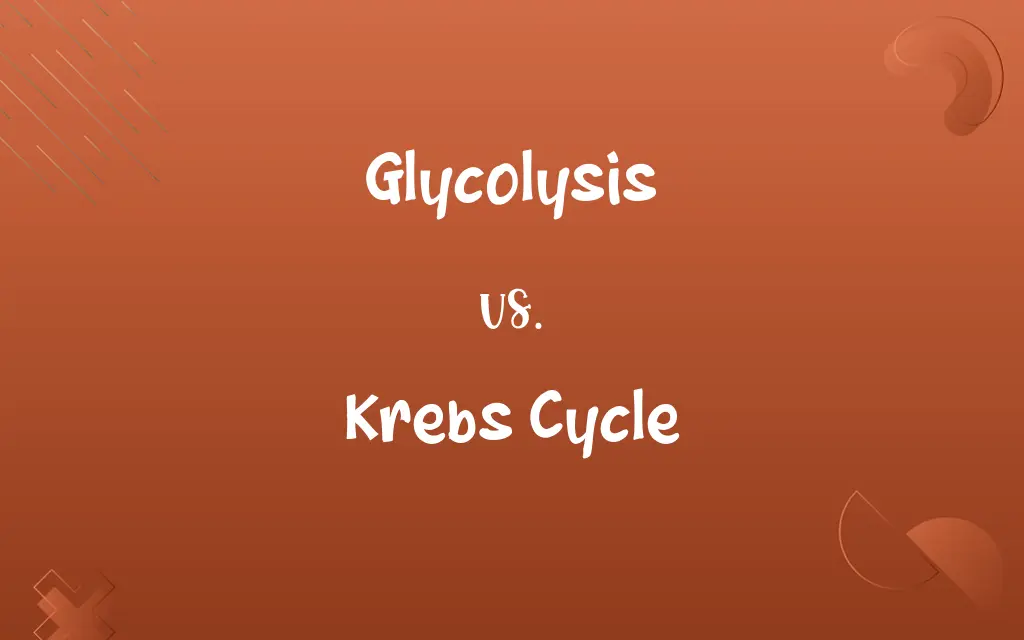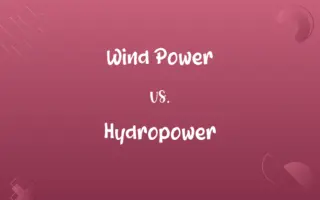Glycolysis vs. Krebs Cycle: Know the Difference

By Shumaila Saeed || Updated on December 25, 2023
Glycolysis is the process of breaking down glucose into pyruvate, producing ATP without oxygen, while the Krebs Cycle, occurring in mitochondria, further oxidizes pyruvate for more ATP, requiring oxygen.

Key Differences
Glycolysis, a universal pathway, initiates cellular respiration by breaking down glucose into two molecules of pyruvate, yielding ATP and NADH without using oxygen. In contrast, the Krebs Cycle, also known as the Citric Acid Cycle, occurs in the mitochondria and further processes pyruvate from glycolysis, requiring oxygen, to produce more ATP, NADH, and FADH2.
Shumaila Saeed
Dec 18, 2023
Occurring in the cytoplasm, Glycolysis is an anaerobic process and the first step in cellular respiration. It is crucial for cells with limited or no oxygen supply. The Krebs Cycle, however, is an aerobic process that takes place after glycolysis only when oxygen is available, emphasizing its role in more oxygen-rich environments.
Shumaila Saeed
Dec 18, 2023
Glycolysis is a ten-step process involving various enzymes that convert glucose into pyruvate, generating a small amount of energy (ATP). The Krebs Cycle, on the other hand, involves a series of enzymatic reactions that further oxidize pyruvate, leading to a larger production of ATP, along with carbon dioxide as a byproduct.
Shumaila Saeed
Dec 18, 2023
A key distinction is that Glycolysis does not require mitochondria and is thus a critical energy source for a wide range of cells, including those in anaerobic conditions. The Krebs Cycle, integral to aerobic respiration, is dependent on mitochondria and is not present in cells that lack these organelles.
Shumaila Saeed
Dec 18, 2023
While Glycolysis produces ATP quickly and is active under both aerobic and anaerobic conditions, the Krebs Cycle is part of a more complex process of energy production, working in tandem with the Electron Transport Chain to produce much more ATP under aerobic conditions.
Shumaila Saeed
Dec 18, 2023
ADVERTISEMENT
Comparison Chart
ADVERTISEMENT
Glycolysis and Krebs Cycle Definitions
Glycolysis
A metabolic process converting glucose into pyruvate, producing energy.
Glycolysis is crucial for generating quick energy in muscle cells during exercise.
Shumaila Saeed
Dec 01, 2023
Krebs Cycle
A series of reactions in mitochondria oxidizing acetyl-CoA to CO2.
The Krebs Cycle plays a pivotal role in cellular respiration and energy production.
Shumaila Saeed
Dec 01, 2023
Glycolysis
The first stage of cellular respiration, functioning without oxygen.
Even in the absence of oxygen, glycolysis can provide energy to cells.
Shumaila Saeed
Dec 01, 2023
Krebs Cycle
Produces ATP, NADH, FADH2, and CO2 from pyruvate.
The Krebs Cycle is efficient in generating high-energy molecules for the cell.
Shumaila Saeed
Dec 01, 2023
Glycolysis
Produces ATP, NADH, and pyruvate from glucose.
Glycolysis efficiently converts one glucose molecule into two pyruvates.
Shumaila Saeed
Dec 01, 2023
ADVERTISEMENT
Krebs Cycle
Part of aerobic respiration, requiring oxygen.
In the presence of oxygen, pyruvate enters the mitochondria to continue in the Krebs Cycle.
Shumaila Saeed
Dec 01, 2023
Glycolysis
An anaerobic process occurring in the cytoplasm.
Glycolysis happens in the cytoplasm of all cells, regardless of their oxygen levels.
Shumaila Saeed
Dec 01, 2023
Krebs Cycle
Central to cellular energy production in aerobic organisms.
The Krebs Cycle is fundamental for energy metabolism in aerobic cells.
Shumaila Saeed
Dec 01, 2023
Glycolysis
A ten-step enzymatic breakdown of glucose.
Each step of glycolysis is facilitated by a specific enzyme.
Shumaila Saeed
Dec 01, 2023
Krebs Cycle
A cyclic series of enzymatic reactions.
Each enzyme in the Krebs Cycle catalyzes a specific reaction.
Shumaila Saeed
Dec 01, 2023
Glycolysis
A metabolic process that occurs in nearly all living cells in which glucose is converted in a series of steps to pyruvic acid and during which energy is released in the form of ATP.
Shumaila Saeed
Dec 01, 2023
Glycolysis
(biochemistry) The cellular degradation of the simple sugar glucose to yield pyruvic acid, and ATP as an energy source
Shumaila Saeed
Dec 01, 2023
Glycolysis
A metabolic process that breaks down carbohydrates and sugars through a series of reactions to either pyruvic acid or lactic acid and release energy for the body in the form of ATP
Shumaila Saeed
Dec 01, 2023
Repeatedly Asked Queries
What is the Krebs Cycle?
A series of reactions in mitochondria oxidizing pyruvate to CO2, producing ATP.
Shumaila Saeed
Dec 18, 2023
What is Glycolysis?
The breakdown of glucose into pyruvate, producing ATP anaerobically.
Shumaila Saeed
Dec 18, 2023
Can Glycolysis occur in all cells?
Yes, it occurs in all cells, including those in anaerobic conditions.
Shumaila Saeed
Dec 18, 2023
Can the Krebs Cycle occur in all cells?
No, only in cells with mitochondria and in the presence of oxygen.
Shumaila Saeed
Dec 18, 2023
Is Glycolysis part of cellular respiration?
Yes, it's the first step in cellular respiration.
Shumaila Saeed
Dec 18, 2023
Is the Krebs Cycle part of cellular respiration?
Yes, it's a key part of aerobic respiration.
Shumaila Saeed
Dec 18, 2023
What happens to pyruvate after Glycolysis?
In aerobic conditions, it enters the mitochondria for the Krebs Cycle.
Shumaila Saeed
Dec 18, 2023
Is the Krebs Cycle a fast or slow process?
It's slower compared to glycolysis, as part of a more complex pathway.
Shumaila Saeed
Dec 18, 2023
Can the Krebs Cycle occur without Glycolysis?
No, it relies on the products of Glycolysis (pyruvate) to start.
Shumaila Saeed
Dec 18, 2023
How much ATP does Glycolysis produce?
2 ATP molecules per glucose molecule.
Shumaila Saeed
Dec 18, 2023
How much ATP does the Krebs Cycle produce?
A few ATP molecules directly, but it generates high-energy carriers that produce more ATP in the Electron Transport Chain.
Shumaila Saeed
Dec 18, 2023
What happens to the NADH produced in the Krebs Cycle?
It goes to the Electron Transport Chain to produce more ATP.
Shumaila Saeed
Dec 18, 2023
Can Glycolysis occur without the Krebs Cycle?
Yes, especially in anaerobic conditions.
Shumaila Saeed
Dec 18, 2023
Share this page
Link for your blog / website
HTML
Link to share via messenger
About Author
Written by
Shumaila SaeedShumaila Saeed, an expert content creator with 6 years of experience, specializes in distilling complex topics into easily digestible comparisons, shining a light on the nuances that both inform and educate readers with clarity and accuracy.








































































